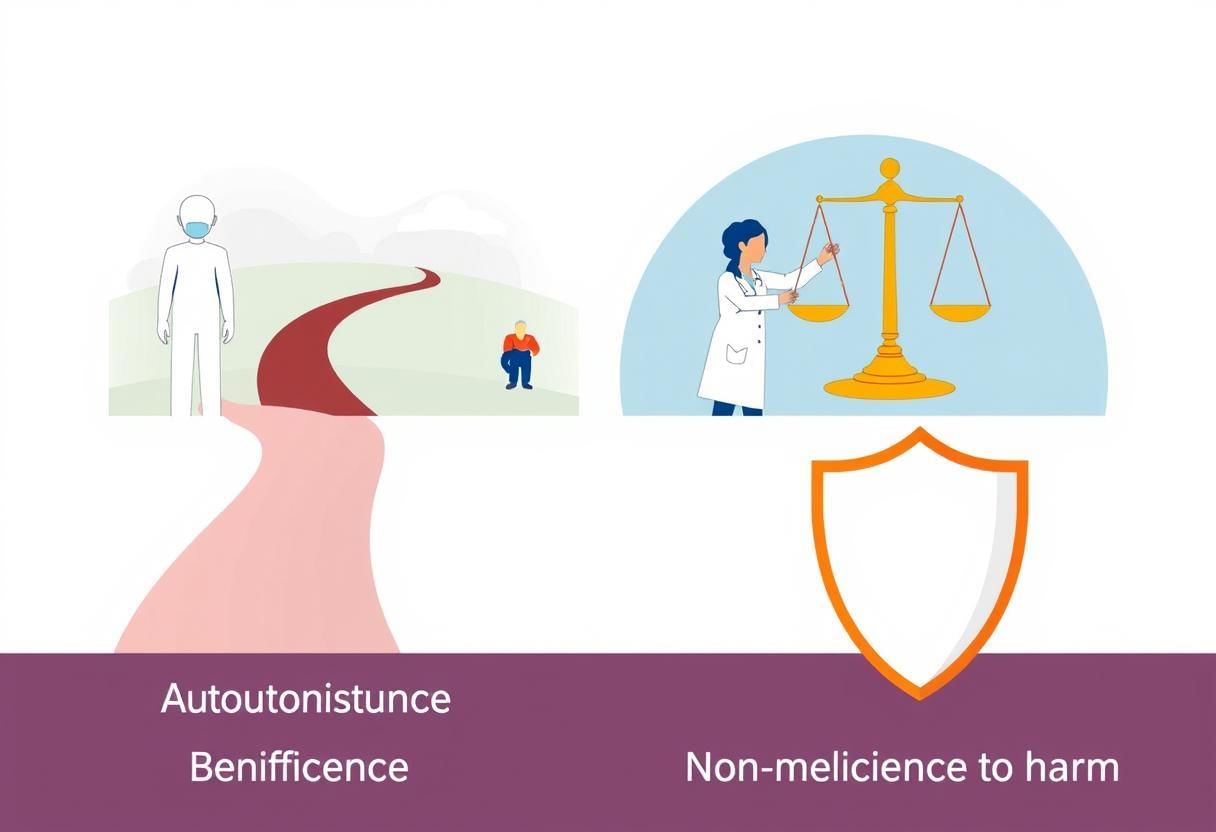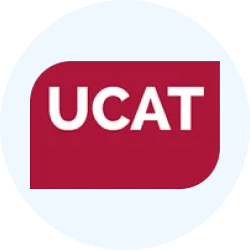Medical Ethics & Professionalism | Situational Judgement for UCAT PDF Download
Medical Ethics & Professionalism for UCAT Situational Judgement Test (In-Depth)
The UCAT Situational Judgement Test (SJT) evaluates your ability to navigate ethical and professional scenarios in medical contexts, assessing qualities like integrity, empathy, and teamwork essential for medical and dental professionals. With 69 questions across 22 scenarios in 26 minutes (~23 seconds per question) in 2025, the SJT tests rapid, principled decision-making. This in-depth guide covers Medical Ethics & Professionalism, providing detailed explanations of 12 key topics, UCAT-level examples, and practice questions to secure Band 1 scores. Topics include core ethical principles, confidentiality, integrity, teamwork, empathy, resilience, accountability, informed consent, fairness, professional boundaries, ethical dilemmas, and SJT-specific strategies. Examples reflect realistic scenarios that align with General Medical Council (GMC) standards. Let’s master the SJT! Ethical Collaboration
Ethical Collaboration
Why This Matters for UCAT SJT
The SJT mirrors real-world challenges in medical training, such as handling patient confidentiality or resolving team conflicts. Scoring in Band 1 (highest) signals strong judgement, boosting medical school applications. Understanding medical ethics and professionalism ensures responses prioritize patient safety, respect, and professional conduct, aligning with GMC’s Good Medical Practice. The tight time constraint demands quick, ethical reasoning, which this chapter equips you to achieve. Healthcare Collaboration
Healthcare Collaboration
1. Core Principles of Medical Ethics
Concept
Medical ethics is built on four pillars that guide decision-making in healthcare:
- Autonomy: Respecting a patient’s right to make informed decisions, even if they conflict with medical advice.
- Beneficence: Acting to promote the patient’s well-being, prioritizing their health and comfort.
- Non-Maleficence: Avoiding harm, including unintended consequences of treatments or actions.
- Justice: Ensuring fair treatment and equitable resource allocation across patients.
These principles often conflict (e.g., autonomy vs. beneficence when a patient refuses treatment), requiring balanced judgement. In the SJT, scenarios test your ability to prioritize these principles based on context, patient needs, and professional standards. Ethical Balance
Ethical Balance
UCAT SJT Relevance: SJT questions present dilemmas where ethical principles clash, such as respecting a patient’s choice versus ensuring their safety. Responses should reflect patient-centered care, balancing autonomy with harm prevention, and align with GMC guidelines. You’ll need to identify the most appropriate action, often choosing diplomacy over coercion.
Example 1: Autonomy vs. Beneficence
During a placement, a patient refuses a blood test costing 150, citing needle phobia, despite its diagnostic value. The doctor asks you to persuade them. How appropriate is it to insist on the test?
Solution:
Autonomy requires respecting the patient’s informed refusal, provided they understand the risks. Beneficence encourages promoting their health, but insistence undermines trust. The appropriate action is to ensure the patient is informed about the test’s benefits and alternatives, then respect their decision, possibly exploring non-invasive options.
Answer: Insisting is inappropriate; prioritize informed consent. Empowered Choices
Empowered Choices
UCAT Tip: In SJT, check if the patient is competent and informed. Respect autonomy unless there’s a clear public safety risk.
Example 2: Justice in Resource Allocation
A clinic has one slot left for a procedure costing 500, with two patients needing it. One is a regular patient; the other is new. How appropriate is it to prioritize the regular patient?
Solution:
Justice demands fair allocation based on clinical need, not familiarity. Prioritizing the regular patient risks bias. The appropriate action is to assess both patients’ medical urgency and allocate the slot objectively, possibly consulting a senior.
Answer: Prioritizing is inappropriate; base decisions on clinical need.
UCAT Tip: Avoid favoritism in SJT. Use objective criteria like urgency or severity to ensure fairness.
2. Patient Confidentiality and Privacy
Concept
Confidentiality protects patient information, only breached with consent or for legal/public safety reasons (e.g., notifiable diseases). Privacy ensures dignity, such as using private spaces for consultations or respecting physical boundaries during examinations. Breaches, even unintentional, erode trust and violate GMC standards. Key considerations:
- Secure storage and communication of patient data.
- Avoiding discussions in public areas (e.g., corridors, cafeterias).
- Recognizing exceptions (e.g., child protection, serious crime).
In SJT scenarios, you’ll evaluate actions that risk or protect confidentiality and privacy, often under time pressure.
UCAT SJT Relevance: SJT questions frequently involve confidentiality breaches (e.g., sharing details publicly) or privacy violations (e.g., examining patients without consent). Responses should prioritize patient trust and adhere to protocols, avoiding public confrontations and favoring discreet escalation.
Example 1: Confidentiality Breach
You overhear a colleague discussing a patient’s diagnosis, costing 200, in a hospital elevator. How appropriate is it to interrupt them publicly?
Solution:
Discussing patient details in public breaches confidentiality. Publicly interrupting risks escalating the breach and embarrassing the colleague. The appropriate action is to privately remind them of confidentiality protocols and escalate to a supervisor if unresolved.
Answer: Interrupting publicly is somewhat inappropriate; address privately.
UCAT Tip: Choose discreet, professional responses in SJT to maintain trust and confidentiality.
Example 2: Privacy Violation
A doctor begins examining a patient in a shared ward without drawing curtains, for a procedure costing 80. How important is it to suggest privacy measures?
Solution:
Examining without privacy violates patient dignity. Suggesting curtains or a private room upholds privacy and trust. This is critical to ensure patient comfort and professionalism.
Answer: Very important
UCAT Tip: Prioritize patient dignity in SJT, especially in physical or sensitive contexts. Urgent Care Assessment
Urgent Care Assessment
3. Integrity and Honesty
Concept
Integrity involves acting honestly and ethically, admitting mistakes, reporting errors, and avoiding misconduct (e.g., falsifying records, cheating). Honesty builds trust with patients and colleagues and ensures accountability. In medical settings, this includes:
- Correcting errors promptly (e.g., wrong documentation).
- Reporting unethical behavior (e.g., colleague misconduct).
- Maintaining academic integrity (e.g., not plagiarizing).
SJT scenarios test your commitment to honesty, often requiring you to balance loyalty to colleagues with patient safety.
UCAT SJT Relevance: SJT questions may involve errors (e.g., incorrect billing) or academic dishonesty (e.g., copying). Responses should demonstrate accountability, prioritizing patient safety and transparency while respecting role boundaries.
Example 1: Correcting an Error
You accidentally log a patient’s consultation fee as 95 instead of 85. How important is it to correct the error immediately?
Solution:
Correcting the error upholds integrity and ensures accurate records, preventing financial or clinical issues. Immediate action, with supervisor notification if required, is critical.
Answer: Very important
UCAT Tip: Act swiftly on errors in SJT, but involve seniors if the error impacts patient care.
Example 2: Witnessing Dishonesty
A colleague claims they completed a patient’s chart, costing 120, but you know they didn’t. How appropriate is it to report this to a supervisor?
Solution:
Falsifying records risks patient safety and violates integrity. The appropriate action is to first encourage the colleague to correct the chart, then report to a supervisor if unresolved to ensure accountability.
Answer: Reporting is appropriate if the colleague doesn’t act.
UCAT Tip: Balance loyalty with duty in SJT. Patient safety justifies escalation.
4. Teamwork and Collaboration
Concept
Teamwork involves collaborating with diverse colleagues (e.g., doctors, nurses) to deliver efficient patient care. It requires respect, clear communication, conflict resolution, and supporting team members under pressure. Key aspects:
- Valuing all roles in the healthcare team.
- Addressing disagreements constructively.
- Balancing team support with personal responsibilities.
 Healthcare Synergy
Healthcare Synergy
SJT scenarios test your ability to foster team synergy while prioritizing patient outcomes.
UCAT SJT Relevance: SJT questions often involve team dynamics, such as supporting a struggling colleague or resolving conflicts. Responses should promote collaboration, respect, and patient-centered care, avoiding actions that disrupt team function.
Example 1: Supporting a Colleague
A nurse is overwhelmed with patient records, delaying a session costing 100 per patient. How appropriate is it to assist with administrative tasks?
Solution:
Assisting promotes teamwork and ensures timely care, provided it’s within your competence and doesn’t neglect your duties. It’s appropriate if feasible, enhancing team efficiency.
Answer: Very appropriate
UCAT Tip: Support colleagues in SJT, but ensure your actions align with your role and patient priorities.
Example 2: Resolving Conflict
Two colleagues argue over a patient’s treatment plan, costing 300, in front of the patient. How important is it to intervene?
Solution:
Arguing in front of the patient undermines trust and professionalism. Intervening to de-escalate (e.g., suggesting a private discussion) protects the patient’s experience and team cohesion, making it critical.
Answer: Very important
UCAT Tip: In SJT, prioritize patient experience in team conflicts, using discreet interventions.
5. Empathy and Patient-Centered Care
Concept
Empathy involves understanding and responding to patients’ emotions, fears, and cultural needs with compassion. Patient-centered care prioritizes their preferences, dignity, and values, ensuring care is tailored and respectful. This includes:
- Active listening to patient concerns.
- Adapting communication for diverse backgrounds.
- Ensuring care aligns with patient goals.
SJT scenarios test your ability to show empathy in emotionally charged or culturally sensitive situations.
UCAT SJT Relevance: SJT questions often involve patient distress, cultural differences, or emotional needs. Responses should demonstrate compassion, active engagement, and respect for patient autonomy, avoiding dismissive or rushed actions.
Example 1: Patient Anxiety
A patient is anxious about a procedure costing 130 and asks for reassurance. How appropriate is it to proceed without addressing their concerns?
Solution:
Ignoring anxiety lacks empathy and risks trust. The appropriate action is to listen, reassure, and explain the procedure’s purpose, ensuring the patient feels supported.
Answer: Proceeding is very inappropriate; respond empathetically.
UCAT Tip: Show active listening in SJT, especially for emotional scenarios, to build trust.
Example 2: Cultural Sensitivity
A patient requests a same-gender doctor for a consultation costing 90 due to cultural beliefs. How important is it to accommodate this?
Solution:
Respecting cultural preferences enhances patient-centered care and comfort. Accommodating the request, if feasible, is critical, consulting a supervisor if resources are limited.
Answer: Very important
UCAT Tip: Prioritize patient preferences in SJT, balancing feasibility with respect. Compassionate Care
Compassionate Care
6. Resilience and Adaptability
Concept
Resilience is maintaining professionalism and composure under stress, such as during emergencies or heavy workloads. Adaptability involves adjusting to unexpected challenges, like resource shortages or schedule changes, while prioritizing patient care. Key skills:
- Managing emotions in high-pressure situations.
- Adjusting plans to meet urgent needs.
- Communicating calmly with patients and colleagues.
SJT scenarios test your ability to stay effective and professional in demanding contexts.
UCAT SJT Relevance: SJT questions may involve delays, emergencies, or resource constraints, requiring calm, adaptive responses that maintain patient trust and care quality.
Example 1: Handling Delays
An emergency delays a patient’s appointment costing 80. How appropriate is it to express frustration to the patient?
Solution:
Expressing frustration is unprofessional and erodes trust. The appropriate action is to apologize, explain the delay calmly, and reschedule promptly, demonstrating resilience.
Answer: Expressing frustration is very inappropriate; stay professional.
UCAT Tip: In SJT, choose calm, patient-focused responses, even under pressure.
Example 2: Resource Shortage
A clinic runs out of supplies for a test costing 110, requiring improvisation. How important is it to adapt the procedure safely?
Solution:
Adapting safely ensures patient care continues without harm. Consulting a supervisor for alternatives or rescheduling is critical to maintain standards.
Answer: Very important
UCAT Tip: Show adaptability in SJT, but prioritize safety and protocol adherence.
7. Accountability and Professional Responsibility
Concept
Accountability involves taking responsibility for your actions, reporting errors, and escalating concerns about patient safety or colleague misconduct. It ensures high standards and trust in healthcare. Key aspects:
- Owning and correcting mistakes promptly.
- Raising concerns respectfully, even about seniors.
- Following protocols for escalation.
SJT scenarios test your duty to act responsibly, balancing respect with patient welfare. Healthcare Adaptability
Healthcare Adaptability
UCAT SJT Relevance: SJT questions often involve errors or safety concerns (e.g., incorrect prescriptions), requiring you to act decisively while maintaining professionalism and diplomacy.
Example 1: Questioning a Senior
You suspect a doctor’s prescription, costing 120, is incorrect. How appropriate is it to raise the concern privately?
Solution:
Raising the concern privately upholds accountability and patient safety. It’s appropriate to discuss respectfully with the doctor or a supervisor, ensuring clarity and correction.
Answer: Very appropriate
UCAT Tip: Use diplomatic, private approaches in SJT when addressing seniors, prioritizing safety.
Example 2: Reporting Misconduct
A colleague skips a mandatory safety check for a procedure costing 250. How important is it to report this?
Solution:
Skipping safety checks risks patient harm and violates accountability. Reporting to a supervisor, after addressing the colleague, is critical to ensure safety and compliance.
Answer: Very important
UCAT Tip: Escalate serious breaches in SJT, but attempt discreet resolution first.
8. Informed Consent and Effective Communication
Concept
Informed consent ensures patients understand treatment risks, benefits, and alternatives before agreeing, supporting autonomy. Effective communication requires clarity, sensitivity, and staying within your role’s scope (e.g., as a student). Key elements:
- Explaining procedures in simple, non-technical terms.
- Checking patient understanding and addressing concerns.
- Referring complex questions to qualified professionals.
 Patient Clarity
Patient Clarity
SJT scenarios test your ability to facilitate consent and communicate appropriately, especially under time constraints.
UCAT SJT Relevance: SJT questions may involve patient confusion or requests for information, requiring you to balance honesty with role limits, ensuring informed decisions without overstepping.
Example 1: Role Boundaries
A patient asks you, a student, for details about a surgery costing 500. How appropriate is it to provide a detailed explanation?
Solution:
Providing detailed medical advice exceeds a student’s role and risks misinformation. The appropriate action is to offer basic information within your scope and refer to a doctor for a full explanation.
Answer: Providing a detailed explanation is inappropriate; refer to a doctor.
UCAT Tip: Respect role limits in SJT, ensuring communication supports consent without overstepping.
Example 2: Clarifying Consent
A patient seems confused about a test costing 90 and hesitates to consent. How important is it to clarify their understanding?
Solution:
Ensuring the patient understands the test’s purpose and risks supports informed consent and trust. Clarifying, or involving a doctor, is critical to proceed ethically.
Answer: Very important
UCAT Tip: Prioritize patient understanding in SJT, using clear, empathetic communication.
9. Fairness and Equality in Healthcare
Concept
Fairness ensures equitable treatment for all patients, regardless of background (e.g., race, gender, socioeconomic status), and just resource allocation. Equality involves addressing biases, challenging discrimination, and advocating for impartial care. Key considerations:
- Allocating resources based on clinical need.
- Recognizing and addressing biased behavior.
- Promoting inclusivity in patient interactions.
SJT scenarios test your commitment to justice, often in contexts of bias or resource scarcity.
UCAT SJT Relevance: SJT questions may involve unequal treatment, biased remarks, or resource allocation dilemmas, requiring responses that uphold fairness and challenge discrimination diplomatically. Patient Care
Patient Care
Example 1: Addressing Bias
A colleague makes a derogatory remark about a patient’s socioeconomic status during a consultation costing 70. How appropriate is it to challenge the remark?
Solution:
The remark violates equality and professionalism. Challenging it privately or reporting to a supervisor upholds fairness and maintains a respectful environment, making it appropriate.
Answer: Very appropriate
UCAT Tip: Address bias discreetly in SJT to promote equality without disrupting patient care.
Example 2: Resource Fairness
Two patients need a limited medication costing 400, but only one dose remains. How important is it to allocate based on medical urgency?
Solution:
Fairness requires allocation based on clinical need, not arbitrary factors. Assessing urgency, possibly with a senior, ensures equitable care and is critical.
Answer: Very important
UCAT Tip: Use objective criteria in SJT resource dilemmas to uphold justice.
10. Professional Boundaries and Role Awareness
Concept
Professional boundaries define the limits of your role, especially as a medical student, ensuring you act within your competence and maintain appropriate relationships with patients and colleagues. This includes:
- Avoiding medical decisions beyond your training (e.g., prescribing).
- Maintaining professional, not personal, relationships.
- Referring tasks or questions to qualified professionals.
SJT scenarios test your ability to recognize and respect these boundaries, prioritizing safety and professionalism.
UCAT SJT Relevance: SJT questions often involve requests for actions beyond your role (e.g., giving medical advice) or inappropriate interactions, requiring responses that uphold boundaries and defer to qualified staff.
Example 1: Overstepping Role
A patient asks you to prescribe medication costing 60. How appropriate is it to comply?
Solution:
Prescribing is beyond a student’s role and risks harm. The appropriate action is to politely decline and refer the patient to a doctor, ensuring safety.
Answer: Complying is very inappropriate; refer to a doctor.
UCAT Tip: In SJT, always defer to qualified professionals for tasks outside your scope. Respectful Dialogue
Respectful Dialogue
Example 2: Inappropriate Interaction
A patient offers you a personal gift worth 50 after a consultation. How appropriate is it to accept?
Solution:
Accepting gifts risks blurring professional boundaries and may imply favoritism. The appropriate action is to politely decline, explaining professional guidelines, and maintain impartiality.
Answer: Accepting is inappropriate; decline respectfully.
UCAT Tip: Maintain professional distance in SJT to avoid conflicts of interest.
11. Handling Ethical Dilemmas
Concept
Ethical dilemmas occur when principles conflict (e.g., confidentiality vs. public safety), requiring structured decision-making. Steps include:
- Identify the conflicting principles (e.g., autonomy vs. beneficence).
- Weigh the risks and benefits of each action.
- Consider GMC guidelines and legal obligations.
- Consult seniors or protocols for complex cases.
SJT scenarios present dilemmas where no option is perfect, testing your ability to prioritize patient welfare and ethical standards under time pressure. Ethical Dilemma
Ethical Dilemma
UCAT SJT Relevance: SJT questions often involve complex dilemmas, such as disclosing confidential information or balancing patient rights with safety. Responses should reflect reasoned judgement, often involving senior guidance.
Example 1: Confidentiality vs. Safety
A patient discloses a contagious condition, costing 400 to treat, but refuses to inform their partner. How important is it to consult a supervisor?
Solution:
Confidentiality protects the patient’s privacy, but public safety may justify disclosure for contagious diseases. Consulting a supervisor ensures ethical and legal compliance, making it critical.
Answer: Very important
UCAT Tip: In SJT dilemmas, seek senior advice to navigate conflicting principles safely.
Example 2: Autonomy vs. Harm
A competent patient insists on discharging themselves against medical advice, risking harm, after a procedure costing 600. How appropriate is it to physically prevent them?
Solution:
Autonomy allows competent patients to make decisions, even risky ones. Physically preventing them violates autonomy and trust. The appropriate action is to ensure they understand the risks, document the decision, and involve a senior if needed.
Answer: Preventing is very inappropriate; respect their decision.
UCAT Tip: Respect autonomy in SJT unless the patient lacks capacity or poses immediate harm.
12. UCAT SJT-Specific Strategies
Concept
The SJT’s rapid pace (~23 seconds per question) and scenario-based format require strategic approaches to analyze options and select optimal responses. Key strategies:
- Understand Principles: Apply the four pillars and GMC standards (e.g., safety, respect) to guide decisions.
- Prioritize Safety: Choose actions that minimize harm and promote patient well-being.
- Use Context: Identify your role, patient needs, and urgency to tailor responses.
- Be Diplomatic: Address errors or conflicts respectfully, avoiding confrontation.
- Time Management: Practice to build speed, focusing on eliminating inappropriate options quickly.
- Test Options: For “appropriateness” questions, evaluate each option against ethical principles.
- Stay Professional: Reflect calmness and professionalism, even in dilemmas.
These strategies ensure efficient, high-scoring responses aligned with medical professionalism.
UCAT SJT Relevance: Mastering these strategies is crucial for navigating the SJT’s volume and complexity, ensuring Band 1 responses that reflect medical school-ready judgement. Critical Care Ethics
Critical Care Ethics
Tips for Success
- Practice with official UCAT SJT questions to familiarize yourself with scenario types and pacing.
- Memorize key ethical principles (e.g., autonomy, beneficence) to apply them quickly.
- For “importance” questions, prioritize actions impacting patient safety or care quality.
- Avoid extreme responses (e.g., ignoring serious errors or confronting publicly) unless justified.
- Use the scenario’s context (e.g., “you are a student”) to avoid overstepping roles.
- Simulate timed conditions (26 minutes for 69 questions) to build speed and accuracy.
- Review GMC’s Good Medical Practice for professional benchmarks, enhancing response alignment.
Practice Questions
These SJT-style questions test your mastery of medical ethics and professionalism, mimicking UCAT formats (rating appropriateness or importance). Ethical Dilemma
Ethical Dilemma
Question 1: Confidentiality
A colleague posts about a patient’s treatment, costing 300, on social media without consent. How appropriate is it to ignore the post?
Solution:
Posting patient details violates confidentiality and trust. Ignoring it allows the breach to persist. The appropriate action is to urge the colleague to remove the post privately and report if unresolved.
Answer: Very inappropriate
Question 2: Integrity
You notice a colleague falsified a patient’s chart, costing 200, to avoid paperwork. How important is it to address this?
Solution:
Falsification risks patient safety and violates integrity. Addressing the colleague, then reporting if uncorrected, is critical to ensure accountability.
Answer: Very important
Question 3: Teamwork
A doctor is delayed, slowing a clinic session costing 110 per patient. How appropriate is it to help with patient triage?
Solution:
Helping with triage promotes teamwork and patient care, if within your competence and duties. It’s appropriate if it aligns with clinic needs.
Answer: Very appropriate
Question 4: Empathy
A patient is upset about a delayed test costing 90. How appropriate is it to dismiss their concerns and proceed?
Solution:
Dismissing concerns lacks empathy and undermines trust. The appropriate action is to acknowledge their frustration, explain the delay, and reassure them.
Answer: Very inappropriate Ethical Empathy
Ethical Empathy
Question 5: Ethical Dilemma
A patient refuses to disclose a contagious condition, costing 400, to their family, risking spread. How important is it to consult a supervisor?
Solution:
Confidentiality conflicts with public safety. Consulting a supervisor ensures ethical and legal compliance, making it critical to navigate the dilemma.
Answer: Very important
Note: The SJT tests judgement, not prior knowledge, but mastering these principles ensures Band 1 responses. Always prioritize patient safety, respect, and professionalism in your reasoning.
|
4 videos|10 docs|24 tests
|
FAQs on Medical Ethics & Professionalism - Situational Judgement for UCAT
| 1. What are the core principles of medical ethics that I need to know for the UCAT SJT? |  |
| 2. How does patient confidentiality impact my approach in the UCAT SJT? |  |
| 3. Why is integrity and honesty important in medical professionalism? |  |
| 4. How can empathy and patient-centered care improve outcomes in medical practice? |  |
| 5. What is informed consent, and why is it critical in medical practice? |  |
















